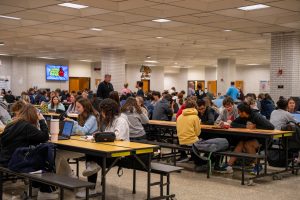No More Artists
Are schools killing creativity?
We’re raised to believe in our own creative thoughts, but when we reach high school a drastic change takes effect.
October 4, 2019
School, the workshop of human intelligence. The central path of our upbringing. The place where we are taught how to talk and walk and act. Where we are taught the proper way to learn and listen and think, right?
We first enter the establishment that is school at the ripe age of five, when we are still empty pitchers, ready to be filled to the brim with knowledge. We are ready to be shaped into the molds of society. And we go willingly, because it’s just what we do.
We start kindergarten happy and ready to learn, looking forward to art class and reading circles and show and tell. We can’t wait to clap and dance and goof around like the children we are. And for a while we do these things — because we are allowed to. The teachers allow us to flourish on our own, as they guide us. They feed the creativity that burns within us when they praise our crayon scribbles and applaud our noisy singing, saying we are the artists of the future.
For the most part, when we’re young, school serves its original purpose. It serves to guide us and nurture us into using our minds. It helps us to grow within ourselves and discover talents that we didn’t know we had. And most importantly, it fuels our creativity. It drives our urge to come up with new and unique ideas and encourages us to display our thoughts through art and music and dance.
Yet as the years go by, school strays from what it should actually be. Instead of encouraging free thought, school conditions us into being just like everybody else.
Fortunately, schools like North Allegheny generally do a good job of providing for students who want to pursue a more creative path by making available classes like pottery, painting, creative writing and a multitude of music courses. And many teachers around the building who don’t necessarily teach “creative” classes manage to engage their students in free thought and make an environment that allows student creativity to survive.
However, this isn’t enough — because the physical institution alone itself isn’t the only thing that deadens creativity, but also the mindset that the institution instills within us.
By the time we’re in high school we have encompassed this mindset that we must pass AP and Honors classes with straight A’s, if we want to enjoy any form of success. Thus, we tend to stray from the creative classes. Our teachers, our peers, and the whole institution of school itself force us to conform to this accustomed way of life all so we can graduate with a 4.0 GPA , get admitted to a reputable college, and land a desk job to pay for life.
Remember when the teachers said we would be artists?
At a very critical point in our childhood development, we fall so deep into this academic mentality that we start to belittle our own creative abilities. We get so used to passing tests and getting good grades that we no longer see our forms of art as good enough. And not only do we compare our own academic achievement to our creative achievement, but we end up comparing ourselves to other students. We rank each other’s creativity unfairly and unrealistically, so much so that we start to believe that if we don’t paint like Van Gogh, play the piano like Chopin, write like Austin or dance like Jackson then we should just give up and aim to major in pre-med, finance, or computer science.
Thoughts like these gradually weave themselves into our minds throughout our education and at the same time tear down our creativity. And for some absurd reason, we don’t do anything to stop it.
We have let academic achievement gain priority over everything else and have let students lose hope in their own creative abilities. If we don’t change the fundamental principles on which we educate our children in favor of ones that allow originality to flourish, then school will surely be the death of creativity for generations to come.













